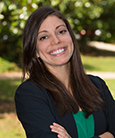Three graduate students at Florida universities have received the John A. Knauss Marine Policy Fellowship, recognizing their outstanding achievement in marine and coastal policy research. The following winners have relocated to Washington, D.C. for one year to work with policymakers in the legislative and executive branches of the federal government.
- Alex Harper, Florida State University
- Erica Towle, University of Miami
- Anna Normand, University of Florida
The National Sea Grant College Program created the Knauss fellowship in 1979 to provide educational experiences to students that have an interest in ocean and coastal resources and in the national policy decisions affecting those resources.
Since Florida Sea Grant was established there have been 57 Knauss fellows from Florida universities.
“The Knauss Fellowship is a unique opportunity. It allows graduate students who are excellent marine scientists to spend a year in Washington learning how science is translated into policy,” said Karl Havens, Florida Sea Grant director. “Florida has truly outstanding fellows this year and I know that they will make substantial contributions to marine policy as well as have great learning experiences.”

Alex Harper
Alex Harper, a doctoral student studying chemical oceanography at Florida State University, was inspired to apply for the Knauss Fellowship after gaining a taste of Washington while interning for the U.S. Congress as an undergraduate. She will be working in NOAA’s ocean acidificaction program.
“I’m prepared to take on this exciting next chapter and use my expertise in chemical oceanography to better protect and manage our invaluable marine resources. This fellowship represents the ideal first step into the science policy field and I could not be more excited for this opportunity,” Harper said.
Harper earned her bachelor’s degree in public policy at American University and her master’s degree in aquatic environmental science from Florida State University. While in graduate school, she also held research positions with the U.S. Geological Survey Water Science Center and the National High Magnetic Field Laboratory testing mercury concentrations in fish.
“When the Deepwater Horizon oil spill occurred, I began working with the Gulf of Mexico Research Initiative’s Deep-C Consortium to determine whether the oil spill had an impact on mercury levels in Gulf fishes,” Haper said.
She plans to use the fellowship to contribute to the field of marine policy by promoting the reduction of harmful pollution emissions in aquatic systems and regulating the accumulation of human-caused toxins in marine food webs.

Anna Normand
Anna Normand, a Ph.D. candidate studying wetland biogeochemistry in the soil and water science department at the University of Florida, will be working for the U.S. Senate Committee on Commerce, Science and Transportation, minority staff, focusing on oceans, atmosphere and the Coast Guard.
Her career goal is to resolve policies related to climate change, sea-level rise and resource sustainability.
“I am very moved by the effects of sea-level rise on our coastal ecosystems and communities. Particularly, my home state of Louisiana is experiencing the highest rate of coastal land loss in the world,” she said. “I want to focus on bridging the science and engineering with policy and public concern for sustainable solutions to changing coastlines.”
Normand, who graduated with a perfect 4.0, received her bachelor’s degree in from Louisiana State University, and has since traveled from arctic to tropical countries for global research as a National Science Foundation graduate research fellow. Her dissertation focuses on what happens to wetland soils when they become warmer, wetter or drier due to climate change.
Isiah Warner, vice president of Strategic Initiatives, said Anna’s ability to look toward the long-term goals of solving problems related to climate change is what sets her apart.
“Anna’s ability to communicate science to any audience and engage with diverse populations will serve her as an advocate to developing solutions and policies to address the growing challenges resulting from climate change,” Warner said.

Erica Towle
Erica Towle recently earned her Ph.D. in the marine biology and fisheries program at the University of Miami’s Rosenstiel School of Marine and Atmospheric Science. She hopes the fellowship will teach her more about how science is translated and used in policy making. She will be also be working with the U.S. Senate Committee on Commerce, Science and Transportation, but for the majority staff, focusing on oceans, atmosphere, fisheries, and the Coast Guard.
“In this era of global climate change, I believe the need is greater than ever to train early-career scientists to be effective communicators and advocates of their science,” she said. “I am committed to gaining a better understanding of how laws affecting marine resources are made. I have the scientific knowledge of the effect of climate change on corals and our oceans. However, I feel a strong need to learn how this science gets communicated to the public and policy makers.”
Towle received her bachelor’s degree in marine and atmospheric science from the University of Miami and was previously an intern at The Island School in the Cape Eleuthera, Bahamas where she conducted coral surveys. Her dissertation research focused on identifying indicators of resilience to climate change in threatened corals.
Chris Langdon, chair of the department of marine biology and ecology at UM, said he was impressed with her work and communications ability, so he offered her a chance to join him in a video interview with National Geographic.
“During the filming process, I watched Erica speak about her science to non-scientists, and I know this experience will translate well in a legislative setting, where she will have to do the same,” Langdon said.
Learn more about the Knauss Fellowship winners on our Current Fellows page, or learn more about the fellowship itself.



